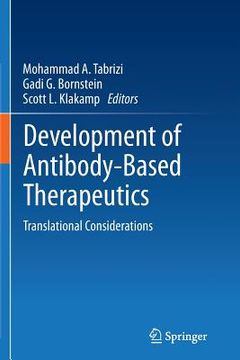Development of Antibody-Based Therapeutics: Translational Considerations (en Inglés)
Reseña del libro "Development of Antibody-Based Therapeutics: Translational Considerations (en Inglés)"
The biologics market continues to witness an impressive rate of growth and the monoclonal antibody market, in particular, has contributed remarkably to the expansion of this segment within the pharmaceutical industry. In 2006, close to 80% of the annual biologics growth rate in the United States (US) was attributed to cancer and anti-TNF antibodies, with increases in growth of 56% and 25%, respectively, compared to those in the previous year. Additionally, the monoclonal antibody sector is anticipated to achieve a growth rate of approximately 14% by 2012, easily outstripping the predicted 0.6% growth rate in the small molecules market. The robust late-stage antibody pipeline within the biotech sector has drawn an increasing amount of interest from the large pharmaceutical industry and has triggered the largest product and platform deals in 2006, with values more than $2.1 and $5.1 billion in partnering and mergers and acquisitions, respectively. Additionally, with the forthcoming emergence of biogenerics, next-generation bio-improved antibodies have drawn much attention and increasingly contribute to the growth of the biologics segment. As next-generation monoclonal antibodies confront their first-generation rivals, it is critical that these next-generation products offer a clear differentiating advantage against the existing competition. Successful strategies for the development of monoclonal antibodies require integration of knowledge with respect to target antigen properties, antibody design criteria such as affinity, isotype selection, Fc domain engineering, pharmacokinetic and pharmacodynamic (PK/PD) properties, antibody cross-reactivity across species, market differentiation opportunities for the first- and next-generation leads, and regulatory requirements from the early stages of antibody development. Biophysical measurements are one of the critical components necessary for the design of effective translational strategies for lead selection and evaluation of relevant animal species for preclinical safety and efficacy studies. Incorporation of effective translational strategies from the early stages of the antibody development process is a necessity, and when considered, it not only reduces development time and cost, but also fosters implementation of rational decision-making throughout all phases of antibody development. Translational strategies for development of antibody-based therapeutics should allow understanding of the relationship between the 'unit dose' and 'unit effect' with respect to both beneficial and deleterious effects from early stages of development. The flow of information from later to earlier stages of development should provide opportunities to facilitate selection of more effective and novel next-generation drug candidates. Selection and evaluation of relevant biomarkers in early preclinical development in "relevant" animal models should allow for identifying potential risks to humans and establishing safe First-In-Human (FIH) dosing strategies. Hence, integration of knowledge with respect to target antigen properties such as antigen distribution, expression profile, kinetic properties, target pharmacology, antigen isoforms and pharmacological redundancy in health and disease, as well as antibody design criteria, such as antibody isotype, affinity, PK/PD and safety is a critical necessity for the design of effective translational strategies. Additionally, these factors will further offer critical differentiating characteristics for next-generation antibodies, and novel technologies prove instrumental in generation of bio-improved antibody candidates for market entry. This book will examine many important considerations necessary for the design of effective translational strategies during the development of antibody-based therapeutics.

